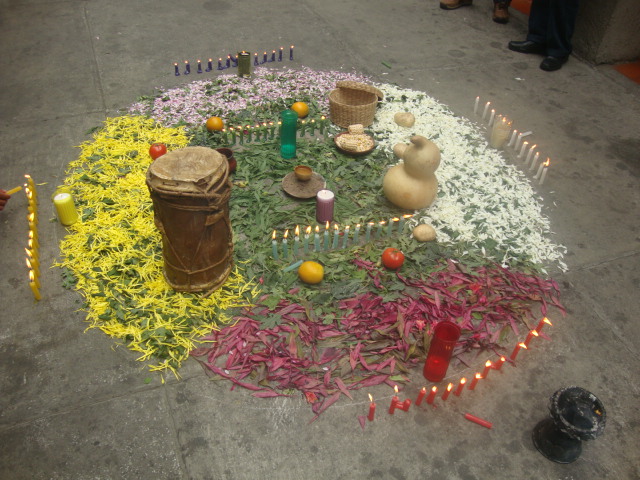
April – That the Secular Comboni Missionaries may always live in the paschal dynamic of death and resurrection in the certainty that the Spirit will continue to guide them on their journey. Lord hear us.

April – That the Secular Comboni Missionaries may always live in the paschal dynamic of death and resurrection in the certainty that the Spirit will continue to guide them on their journey. Lord hear us.
We present to you an interview with Cristina Souza about her missionary experience in the Central African Republic.
(The interview is in Portuguese).
On March 5-6 we held the second meeting of the Comboni Social Forum 2021. If in previous editions this event coincided with the Global Social Forums, this time we chose to hold it online, which allowed us to enrich the participation, exceeding 200 participants. This meeting is a continuation of last December’s meeting, which reflected on Comboni ministerialities.
This edition of the CSF was based on the challenges of the significance of the Comboni mission, synodality within the Comboni Family and the style of life. In order to advance answers, it was designed the Mapping of Social Ministry in the Comboni Family, that it was presented at this meeting. A total of 205 Comboni presences were collected over several months and are now presented on a dedicated website which can also be accessed from the website of the General Secretariat for the Mission of the MCCJ.
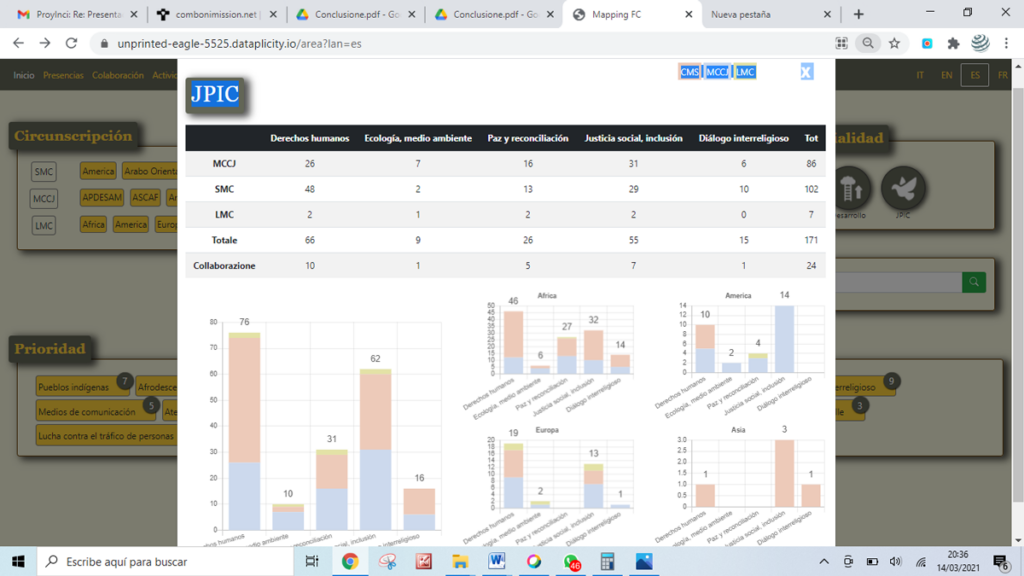
In a formidable task, the various presences have been classified according to the institute that coordinates them, the geographical region, the sector [Health, Education, Development and Justice, Peace and Integrity of Creation (JPIC)] and the priority area, among which we can find Afro descent people, human trafficking, missionary animation, migrants…. Each sector is further subdivided into more specific sectors, in order to give as much detail as possible to each presence.
By entering in each continent, you can access the concrete presences that are present in it, each one presented through a complete card that includes a brief summary, the Comboni charism to which it is linked, the Sustainable Development Goals involved or the human groups that are mainly involved. Among the charisms, we can highlight Making Common Cause, Regenerating Africa with Africa, Cenacle of Apostles or At the Foot of the Cross.
It also includes a very interesting element of analysis, the Social Ministry Rhombus, which allows us to quickly visualize this concrete presence according to 2 dimensions: direct service and Justice and Peace:
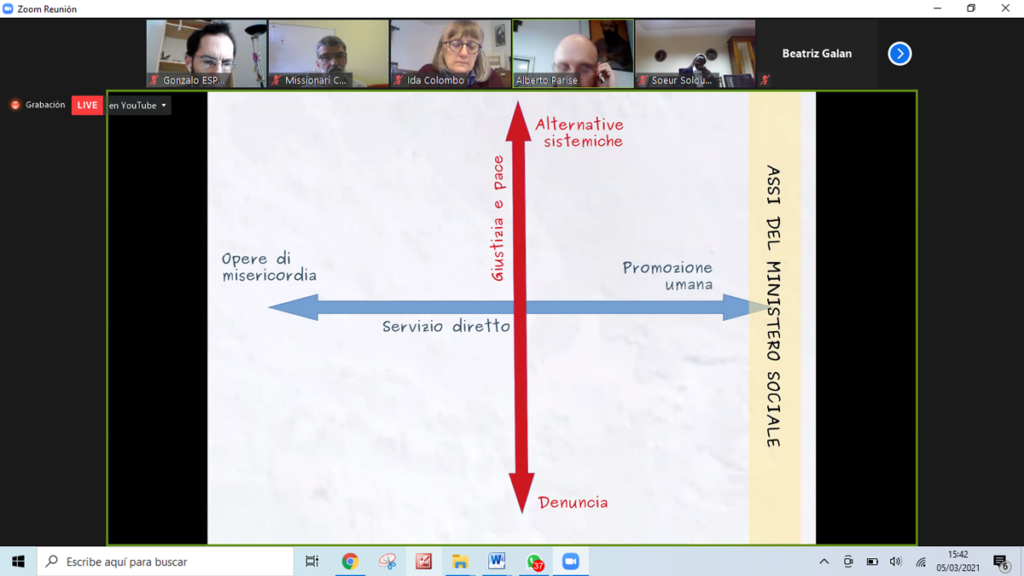
This rhombus can be used to visualize the complete set of all the presences, but also by continents or according to which institute is leading it:
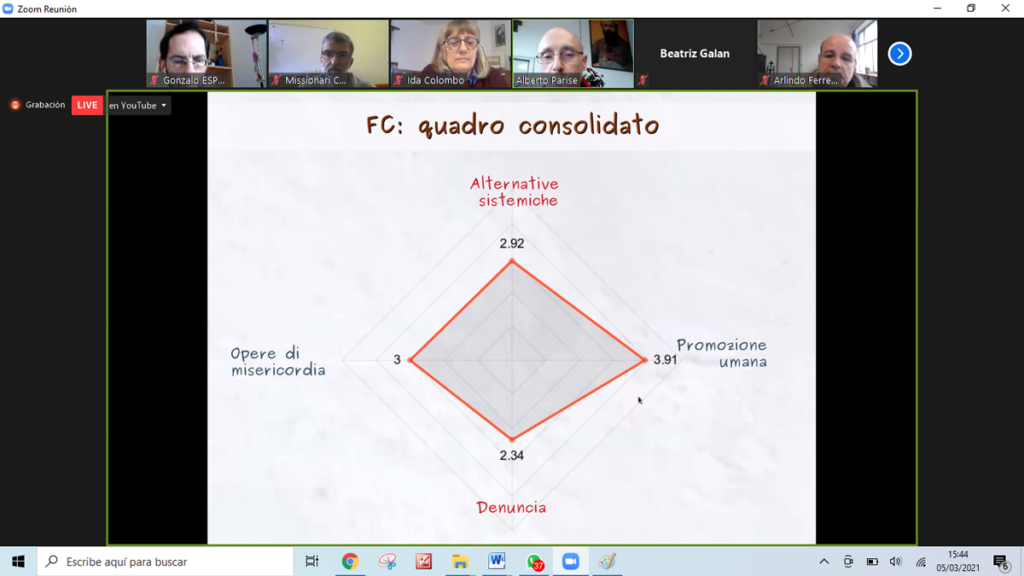
A first impression shows that the dimension most present is that of human promotion, while that of denunciation is in the minority. In Africa, this approach is even clearer, and with regard to CLM-led presences, the weight of the vertical axis of JPIC is greater than the average.
Other very relevant aspects of the mapping is the articulation of each presence with civil or ecclesial entities and the joint participation of various branches of the Comboni Family in the mapping.
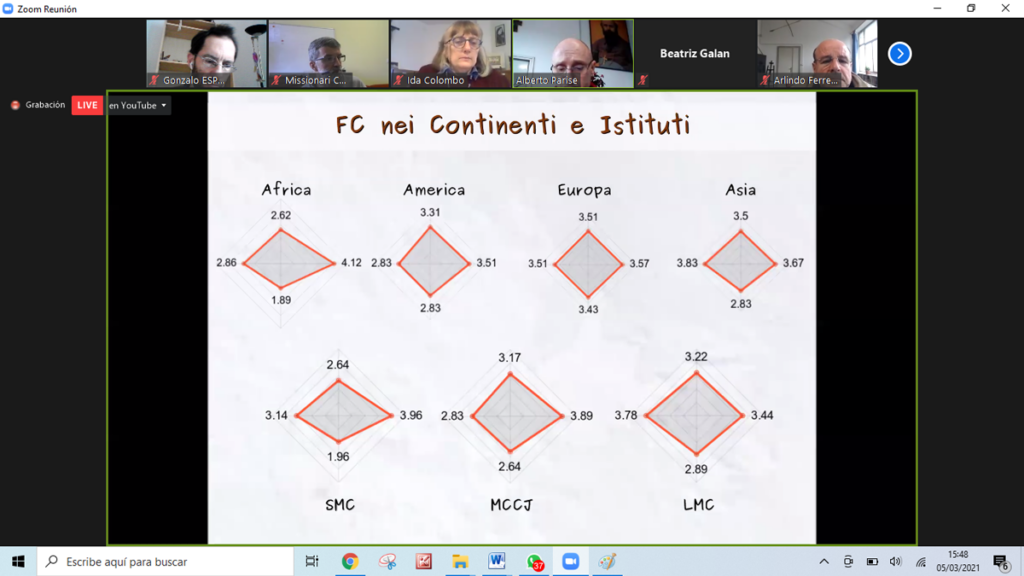
It is not possible to summarize all the information presented in this mapping but rather to invite each one to explore it according to his own concerns. On the other hand, the conclusions of the mapping presented during the CSF insist on the need to grow in the dimension of prophetic denunciation. In these conclusions we also highlight the challenge of synodality, since this first picture that we have drawn invites us to share among similar projects in terms of geography, sector, field… for shared reflection-action. And the powerful systemic approach that allows us to seek new answers to the enormous missionary challenges we face. It is an injection of enthusiasm to know all the Comboni presences documented and all that this mapping invites us to grow in the service of the Kingdom.
Gonzalo Violero, CLM Spain
« I have come to bring fire to the earth and how I wish it were blazing already! » (Lk 12,49)
Keeping the flame alive
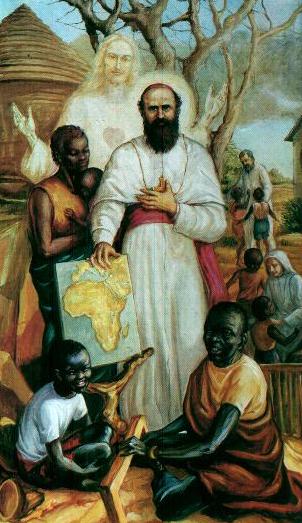
Introduction. As we celebrate the 190th anniversary of the birth of Daniel Comboni (Limone Sul Garda, 15 March 1831) and the 140th anniversary of his death (Khartoum, 10 October 1881), we are invited to celebrate our charismatic memorial and to invoke the presence of the Spirit which illumined his life from birth to death. His beatification (17 March 1996), whose 25th anniversary recurs this year, was a charismatic gift for the entire Comboni Family. On that occasion, ([1]), the general councils published a message together with a letter to encourage the members of our missionary family to be joyful and to gaze in spiritual manner at our father, seeking inspiration and fruitfulness for our missionary service. Finally, with the canonisation, the Church enrolled him in the register of saints, recognising the validity and relevance of the Comboni missionary charism and proposing St Daniel Comboni as a model of Christian life and mission, the example and paradigm of universal missionary commitment, which unites different continents and people in the passion for God and Humanity. Then too, our general councils gifted us with a message ([2]) and a letter ([3]) inviting us to look upon St Daniel as the witness and master of that sanctity to which we are called and the mission we live. This letter is part of this movement of the memorial and actualisation of the charismatic gift entrusted to St Daniel and, in him, to all of us: a gift from God that is revived in every Comboni generation.
Considering his roots. The memorial we keep of the birth of St Daniel Comboni invites us, before all else, to consider the family, ecclesial and social roots that influenced him so much and which he often mentioned ([4]). His birth occurred amid difficulties and limitations. His parents were migrants, having come to Limone looking for work. His father, Luigi Comboni had, at the age of fifteen, come to Limone from Bogliaco in December 1818. His mother, Domenica Pace, was born in Limone (31 March 1801) but her family was from Magasa, in the mountains. Luigi and Domenica married on 21 July 1826, in the church of St Benedict and, according to the baptismal register, had six children; to these we may also add twins who died and were not baptised ([5]).
“Daniel Comboni grew up with his parents in their modest house in Tesol, sharing the joys and sorrows of the family. Of all his siblings, only Vigilio (1827-1848) and Marianna (1832-1836) survived” ([6]). He had great affection and esteem for his mother and father. His mother died on 14 July 1858, during his first journey to Africa, and it was with his father Luigi that Daniel kept up constant correspondence in which he recognised the religiosity of his parents and the influence they had on his missionary life and vocation. Contained in those letters are the human and Christian elements that constituted the fertile soil that gave growth to the vocation and mission of St Daniel (the memory of the beauty of the lake and the mountains, pride in Christian faith and life, devotion to the Cross and the Saviour, the contemplation of his love and Pierced Heart, the passion for God and the most needy): “Have courage therefore, my dear father. I have always opened my heart to you, I speak to you every day, I am aware of your worries and I am enjoying a foretaste of the delights God has reserved for you in heaven. Courage therefore! May God be the centre of communication between us. May he guide our undertakings, our affairs, our destiny and let us rejoice that we are dealing with a good master, a faithful friend and a loving father” ([7]). The celebration of the 190th anniversary of his birth gives us a new opportunity to come closer to him and his family and ecclesial roots, strengthening awareness of our own roots as a spiritual background that gives stability to our personalities and spiritual fecundity to our missionary life. This celebration also gives us an opportunity, as the Comboni Family, to deepen the role of Limone and to continue the collaboration undertaken at the birthplace of St Daniel Comboni.
Faithfulness in the midst of adversity. The memorial of the 140th anniversary of the death of Daniel Comboni invites us to look at his life from the viewpoint of the supreme moment of his gift of himself for the regeneration of Nigrizia. In the letters he wrote during the last months of his life, he appears to be a missionary surrounded by difficulties but rooted in the faith: famine, plague and hunger, the lack of water, the scarcity of means to keep the missionary work going, the sickness and death of his missionaries … In his own words, those were “times of desolation” when “the sufferings to be alleviated are unfortunately too many” ([8]).
Faced with such difficulties, Comboni remains anchored in faith in God and the missionary vision that inspired and sustained his life. “I am happy in the cross which, when borne willingly out of love for God, gives birth to victory and eternal life”: these words ([9]) sum up, at a crucial moment, the mindset of his whole life. His return to the foot of the Cross, to the contemplation of the Pierced Heart where it all began, fills with light and courage the moment of his return to the Father and lies at the origin of the confidence and “courage for the present and even more for the future” ([10]) that Comboni instils in his missionaries in the moment of A-Dio: “I die but my work will not die!” ([11]).
The two dates of the memorial we keep this year mark out a life’s journey in which the power of the Spirit takes shape in the life of St Daniel and renders perceptible and alive a small patch “of the unlimited love” of God ([12]); he lets himself be “formed” by the Love he contemplates, keeping his gaze fixed on Jesus crucified. St Daniel leaves us a testimony that generates life for our time.
Birth and death. We are celebrating these anniversaries of the life of St Daniel Comboni after a year, 2020, that was marked by the coronavirus pandemic and after having begun the year 2021 while the whole world is still experiencing uncertainty in public health and the economy. In the Comboni Family, we too are suffering the consequences of this situation: we have lost men and women missionaries who, after many years of mission, enriched us with their testimonies and hoped to live out their old age in peace ([13]); the pace of our activities has been brought to a halt and our plans and projects have been suspended; the limits placed on our travelling has sorely tried us, challenging us to be creatively close to the poorest and the least and those most affected by the pandemic; we feel unable to find a way out and we share the feeling of disorientation and loss that is overpowering many of our brothers and sisters.
Seeing Daniel Comboni and in the span of his missionary life and vocation, from birth to death, we understand how, in the moment of crisis and uncertainty, he recognised and awaited the movement of the Spirit, reviewed his plans and renewed his missionary commitment, embraced the Cross and its difficulties, seeing in all these things a sign of the loving presence and mysterious action of God, of a divine hour with its promise of renewed life. In all these situations, he yields to the attraction of the love of God for Africa and he is not afraid to be part of a tiny group; he perseveres, plans, takes risks and is able to offer his life, without counting the cost. From him we learn the attitudes we need to live through such uncertain times as the hour of God: patience and faithfulness to the missionary vocation; the ability to involve ourselves creatively, always placing people and God at the centre; the sense of communion (being a cenacle) that keeps us together and strengthens our charismatic identity and our missionary vocation in the Church of today.
Daniel Comboni urges us never to allow the burden of Covid-19 and the negative consequences of social distancing to close us in upon ourselves but to overcome conflict and competition and regain the spirit of collaboration between laymen and laywomen, sisters, brothers and priests; to increase the feeling of communion and friendliness of living together which Comboni recommended to his followers; to keep hope alive, even in darkness and rediscover the strength to care for ourselves and to be resilient; to accept the changes that are taking place and see opportunities where others see failure; to assume birth and death as doors to pass through, challenges to our creativity and occasions for mutual support; to consider losses (lives, occupations, health and economic security …) as an opportunity for conversion and support among ourselves, individuals, families and communities. During the pandemic we have maintained communion, we have exchanged information and set in motion processes such as the Social Ministeriality Forum with meetings held using Zoom; the present situation challenges us to find new ways of being united as a Comboni Family, to face together difficult movements and changes and continue the process of collaboration ([14]).
The light of the testimony of St Daniel Comboni illumines the discernment that what we are living calls us to prepare for the immediate future which will not simply be a return to the familiar past. It offers us criteria for assuming the values we hold dear, the friendship and affection of family and friends; to understand the common destiny of humanity, threatened by the pandemic and ecological disaster; to commit ourselves to social transformation (including climate change, care for our common home and healthcare for every person …) giving our contribution creatively, rejecting the superfluous and favouring solidarity.
These attitudes are rooted in the faith, in “a strong awareness of God” and “lively interest in his Glory and the good of people”, especially the impoverished and marginalised who are the antidote St Daniel suggests to counteract the stress of the pandemic and the uncertainty of the times we live in. He inspires us to see the world and the events we are living with “the pure eye of faith” ([15]) and warns us that any missionary, whether man or woman, lacking this attitude “will end up in a kind of emptiness and intolerable isolation” ([16]). He also points out the way to remain faithful: “… to keep one’s gaze fixed on Jesus Christ, loving him tenderly and striving to understand better every moment that passes the meaning of a God dead on a cross …” ([17]). Comboni speaks of an “impetus of divine fire” coming from the Pierced Heart which men and women missionaries receive at the foot of the Cross to take everywhere; that flame that nourishes their commitment to the regeneration of people and the transformation of the society in which they live ([18]).
Keeping the fire burning. The memorial of the birth and death of St Daniel Comboni reminds us that the chief challenge we are faced with at this time is precisely that of keeping alive this flame, this divine impetus burning in our hearts and “seeing the beauty of the spiritual paternity of St Daniel whose heart was burning and (…) succeeded in prophetically kindling the fire of the Gospel, overcoming boundaries, (…), suffering misunderstandings, limiting visions and concretising an innovative missionary vision”. Fidelity to Daniel Comboni is played out in “keeping to the path he has commenced” and in “believing in the power of the fire of the Spirit (…) that comes down upon us and makes us courageous frequenters of the future” ([19]).
General Councils of the SCM, CMS and the MCCJ and the International Commission of the CLM
[1] Letter dated 23 February 1996, for the Day of Reconciliation. The message “Gazing at the rock from which we were carved” is dated 6 April 1995.
[2] “A Gift to be Welcomed and Studied” dated 15 March 2003.
[3] “Daniel Comboni, Witness of Holiness and Master of Mission” dated 1 September 2003.
[4] Both by visiting his native home and especially by letters to his parents, to his father after his mother had died, to his cousins, the parish priests and citizens of Limone. The correspondence of Daniel Comboni with his father includes 31 letters. The first was written from Cairo on 19 October 1857, the last on 6 September 1881, a month before his death.
[5] Positio, Roma 1988, Vol. I, p. 14.
[6] Mario Trebeschi and Domenico Fava, San Daniele Comboni e Limone, Limone sul Garda 2011, p. 39.
[7] Daniel Comboni, Writings 188.
[8] Daniel Comboni, Writings 6631.
[9] Letter to Sembianti, Writings 7246.
[10] In Annals of the Good Shepherd 27 January 1882.
[11] Giovanni Dichtl, letter to Cardinal Simeoni, 29.9.1889.
[12] Daniel Comboni, Homily in Khartum, Writings 3158.
[13] During the first wave of the pandemic, 13 Comboni Missionary Sisters died in Bergamo. In the second wave, between 8 November 2020 and 10 January 2021, 20 Comboni Missionaries died in Castel d’Azzano; others died later in Milan, Ellwangen (Germany), Guadalajara (Mexico) and in Uganda; a total of 35. Altogether, up to the end of January 2021, 48 Comboni men and women missionaries died victims of Covid-19.
[14] During the Social Ministeriality Forum, the member of the Comboni Family commission reflected together on this time as a good opportunity for new modes of encounter, while waiting for better times when we can meet face to face. To keep the process going, two webinars were planned. For the first one in December, 279 people registered, representing the Comboni Family all over the world.
[15] Daniel Comboni, Homily in Khartoum, Writings 2745.
[16] Daniel Comboni, Rules of 1871, Chapter X.
[17] Daniel Comboni, Rules of 1871, Chapter X.
[18] Daniel Comboni, Plan for the Regeneration of Africa, IV Edition, Verona 1871, Writings 2742. “… Then he was carried away by the impetus of that love set alight by the divine flame on Golgotha and came forth from the side of the Crucified One to embrace the whole human family…”.
[19] Cardinal José Tolentino de Mendonça, Homily for the memorial of St Daniel Comboni, Rome 10 October 2020.
Sharing God’s love with others, receiving and giving, have determined our missionary vocation (Vicenta Llorca, Comboni Missionary Sister in Ethiopia for more than 40 years and Pedro Nascimento, Comboni Lay Missionary, two years in Ethiopia). As he did with Abraham, also to us, through prayer and personal discernment, God said: “Leave your country and go to the land that I will show you” (Gn 12:1). Our destination was Ethiopia, a country full of sunshine and hospitality. Ethiopia is a beautiful country, rich in history and culture, full of traditions and many peoples, with great linguistic diversity.
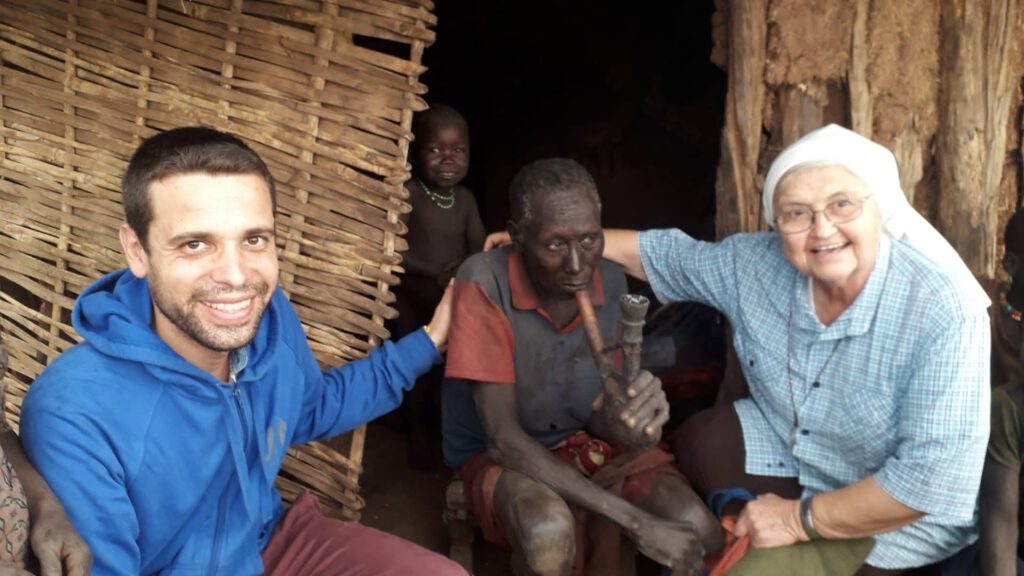
Benishangul-Gumuz is part of one of the regions of Ethiopia and one of the tribes present here is the Gumuz, a people of strong character, ready to fight to defend themselves in many ways. Our missionary work is especially among the Gumuz.
Our first impression was very good, as we always wanted to share our life with such a simple people. The community of the Comboni Sisters, located in Mandura, offers education, health care and catechetical pastoral care. The community of Comboni Lay Missionaries (David Aguilera and Pedro Nascimento) lives with the Comboni religious in Guilguel Beles, ten kilometers from Mandura, and tries to help both communities in the areas of education and catechetical ministry, as well as in the care of some of the sick.
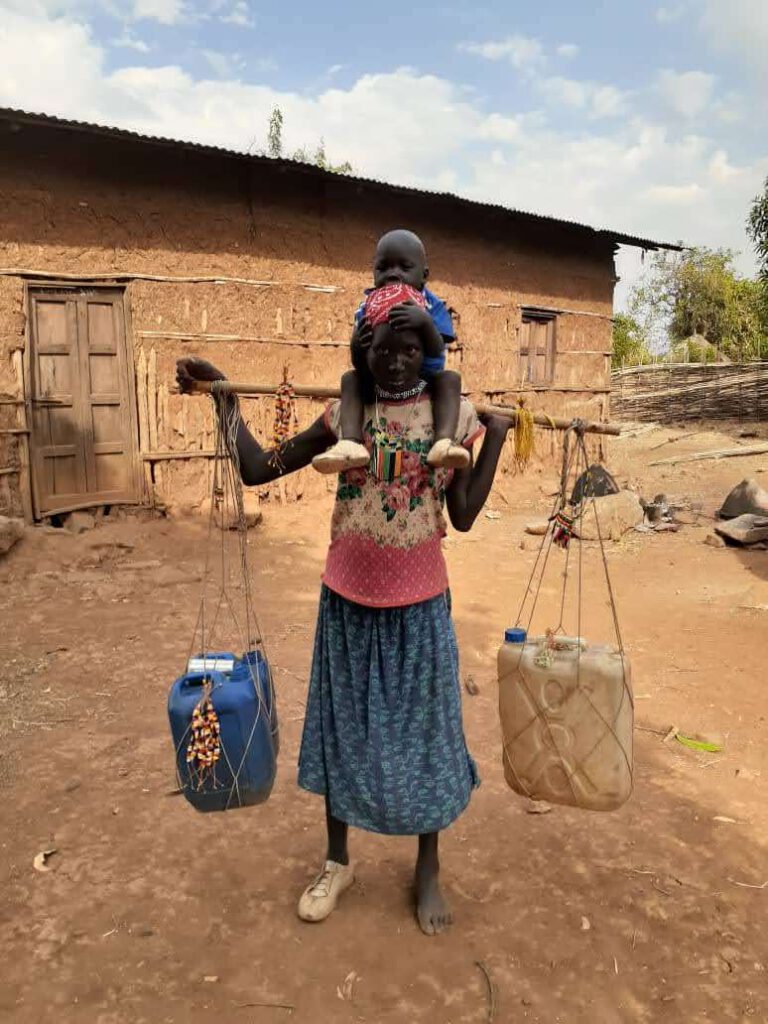
Vicenta and Pedro work in pastoral and social service, since the person is complete with the development of the soul and body. One of the activities we carry out together is the accompaniment of the catechesis of women in their spiritual, human and material development. We know that women have an important role in the transformation of society and here they need to be aware of this. Gumuz women work very hard and are often left behind in opportunities such as education, where educational attainment is not a priority, especially for women and girls. Above all, they have to work in the fields, collect firewood for cooking, carry water from the spring or river, carry heavy sacks of cereals (the fruit of their work in the fields), take care of their children, cook…. The life of the Gumuz woman is difficult and full of sacrifices and hard work.
We meet every week with a group of women who have chosen a name for the group: “Peace Builders”, a name due to the war situation that we have been living for more than two years in our area. In this group we share the Word of God, pray for peace and have coffee together with the economic collaboration of all, and we become close in our experiences of pain and suffering, strengthen our friendship, share dreams and aspirations for the future. These meetings give us the possibility to get to know each other and to be closer to each other. It is our desire, according to our possibilities, to develop activities that can help women in the economic part, since they have an important role in the maintenance of the family.
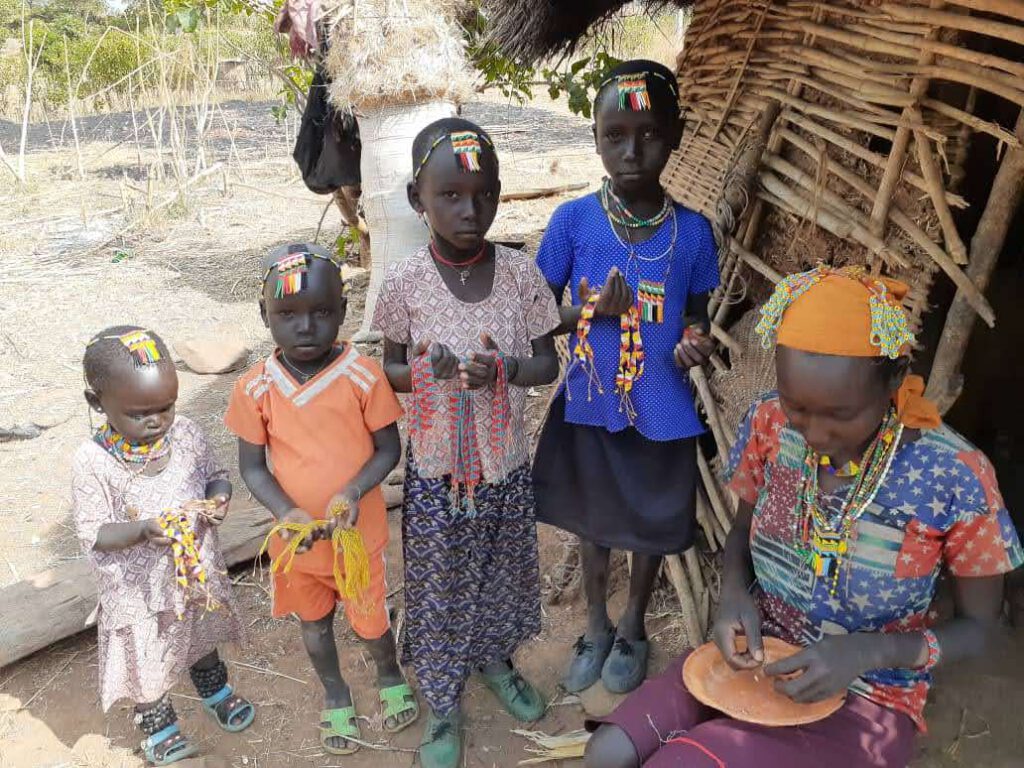
All this is very beautiful and attractive, but human life is made of happy moments and painful moments, days of light and days of darkness.
Due to ethnic clashes, especially over land ownership, social stability has worsened, many have been killed, villages have been burned, some crops have been stolen by opportunists, many innocent people have been imprisoned without knowing the reasons, schools and medical posts have been closed due to insecurity, for fear of students being attacked by rebels and teachers and nurses attacked and kidnapped, as most of them belong to another ethnic group. Unfortunately, this has been our reality for the past two years, with times of peace and times of conflict and insecurity. However, whether we live or die, we belong to the Lord (Rom 14:8) and He is always with us and accompanies us.
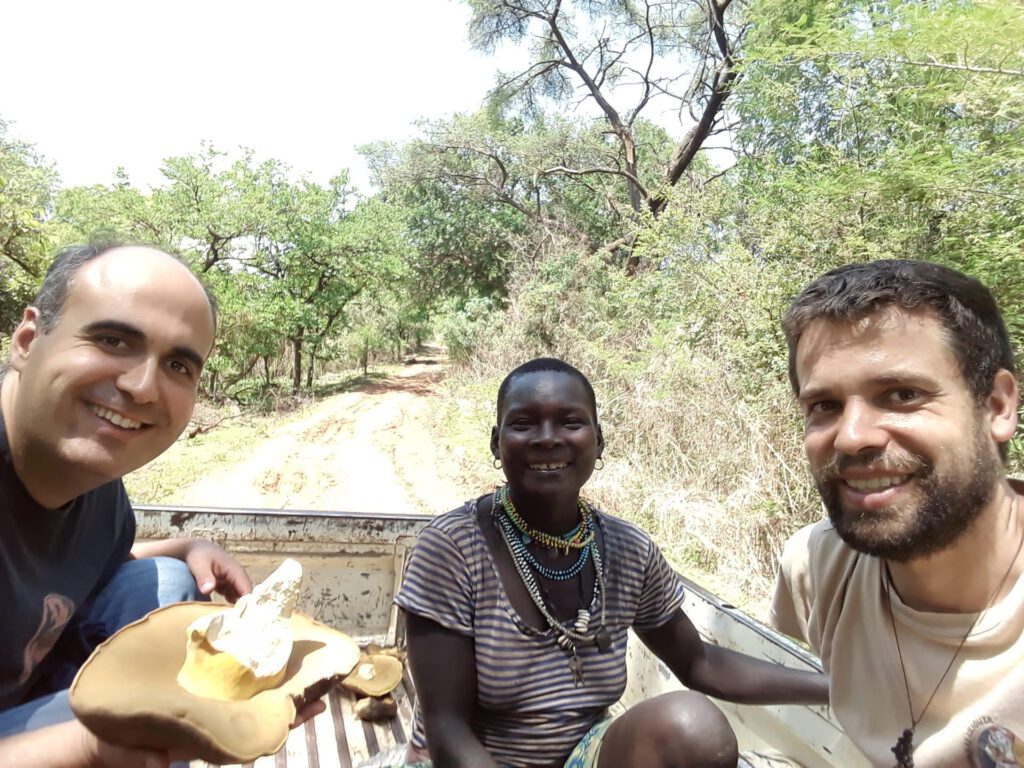
In the Sisters’ mission, some women asked for protection for few weeks, staying there to sleep. The situation worsened and they decided to escape to the forest, where they were able to hide. When the situation calmed down, little by little, the families returned to their huts. As we have already said, this situation has been repeated for two years and together we have experienced pain, insecurity, but also God’s protection. The works of God are born and grow at the foot of the Cross, as St. Daniel Comboni used to say.
None of this was foreseen when, full of illusions, we came to this mission, but we decided to make common cause with this people, to share the good and the bad moments, we decided to stay here and abandon ourselves in God’s hands. We have lived through many difficult moments and our presence here, in the midst of difficulties, is intended to be a testimony of fidelity to God manifested in fidelity to the people with whom we share our lives. It was Jesus who told us: “Behold, I am with you always, to the close of the age” (Mt 28:20).
In the midst of pain, of seeing the suffering of those who escape, of those who mourn for their loved ones, either because they have died or because they are deprived of their freedom, all this has become a time of grace that helps us to strengthen our faith and fidelity to a people who live in times of suffering. Making the pain of others my own shows us how important they are to us, how much we love them. St. Daniel Comboni taught us: I make common cause with you and the happiest day of my life will be the one when I give my life for you.
Right now peace talks are taking place between the government and rebel groups, schools and medical posts (some) are beginning to open. We are hopeful for times of peace, happiness and prosperity.
Pray for us and for the people of Ethiopia, because we cannot lose hope; pray that we will find support to develop economic activities with women and help families in need; pray for peace and fraternal communion.
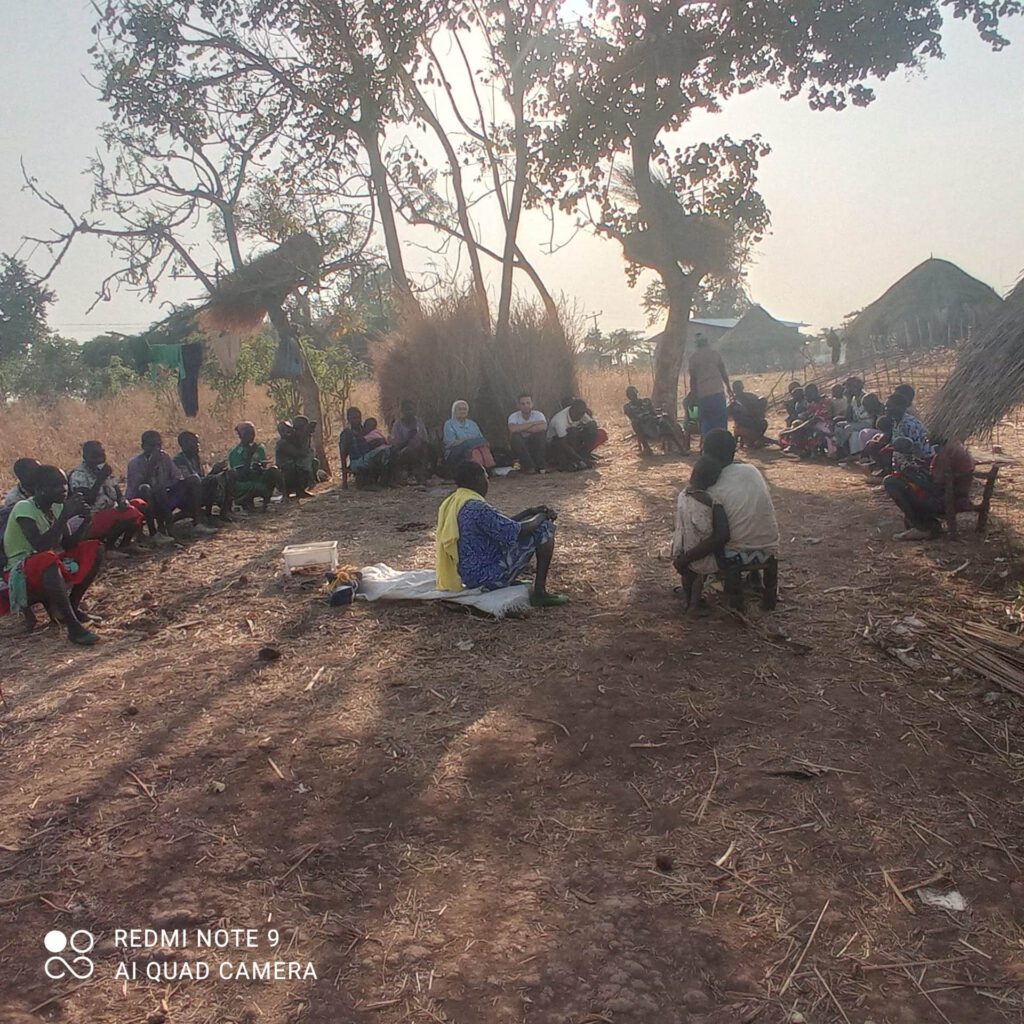
Vicenta Llorca, Comboni Missionary Sister and Pedro Nascimento, Comboni Lay Missionary.